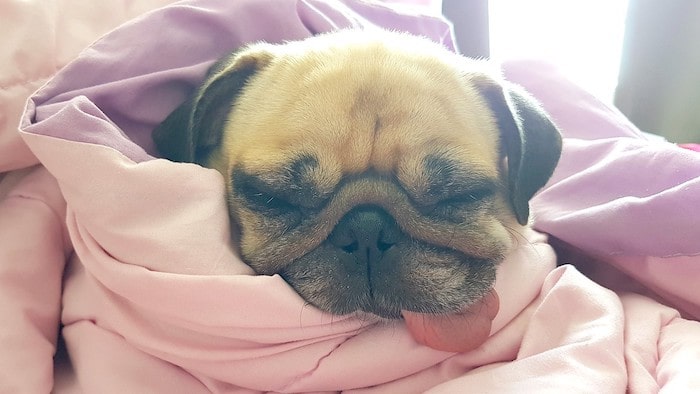Have you ever observed your furry companion engaging in a peculiar behavior of licking blankets? Perhaps you’ve wondered why they find such an activity fascinating.
As dog owners, we’re constantly trying to decipher the thoughts and motivations behind our pets’ behaviors, and blanket licking is no exception. In this article, we delve into the fascinating world of canine behavior to uncover the reasons behind why dogs engage in this seemingly quirky habit.

While blanket licking may appear odd to us, it holds deeper significance for our four-legged friends. Dogs communicate through various means, and their behaviors often serve as a form of expression.
From instinctual habits to emotional needs, there are several factors that contribute to this behavior. By understanding why dogs lick blankets, we can gain valuable insights into their world and strengthen our bond with our beloved companions.
So, if you’re ready to embark on a journey of discovery and unravel the mystery behind why dogs lick blankets, let’s dive in and explore the fascinating reasons that drive this peculiar habit.
Table of Contents
What is Blanket Licking and Why is it Common Among Dogs?
Blanket licking is a behavior where dogs lick their blankets or other soft items repeatedly and excessively. It can be a normal and natural behavior for dogs, as they use their tongues to explore their environment, groom themselves, and show affection. Licking can also release endorphins, which are chemicals that make dogs feel happy and relaxed.

However, blanket licking can also become a compulsive or obsessive behavior that interferes with the dog’s normal functioning and well-being.
Some dogs may lick their blankets to cope with stress, boredom, anxiety, hunger, or health issues. They may also develop a preference or attachment to a specific item that they lick constantly.
Possible Causes of Blanket Licking
There are many possible causes of blanket licking in dogs, and they can vary depending on the individual dog and their situation. Some of the most common causes are:
Gastrointestinal issues
Dogs may lick blankets to relieve nausea or discomfort from digestive problems. They may have parasites, infections, food allergies, or other issues that affect their stomach and intestines.
Licking blankets can help them release endorphins, which are natural painkillers. It can also help them induce vomiting, which can make them feel better.
If you suspect your dog has a digestive issue, you should consult a vet as soon as possible. They can diagnose the problem and prescribe the appropriate treatment.
You should also monitor your dog’s appetite, stool, and weight, and report any changes to your vet.
Adrenal (kidney) diseases
Dogs may lick blankets to quench their thirst from kidney diseases. They may have Cushing’s disease or Addison’s disease, which are conditions that affect the adrenal glands and cause excessive thirst and urination.Dogs with kidney diseases may also have other symptoms, such as vomiting, diarrhea, weight loss, or lethargy.
If you suspect your dog has a kidney disease, you should bring them to a vet as soon as possible. They can perform blood tests and urine tests to confirm the diagnosis and recommend the best treatment. You should also provide your dog with fresh water at all times and avoid salty foods.
Dental problems
Dogs may lick blankets to soothe their mouth from dental problems. They may have tooth decay, gum disease, oral tumors, or other issues that cause pain, swelling, or bleeding in their mouth. Licking blankets can help them numb the pain or clean the wound.
If you suspect your dog has a dental problem, you should check their mouth regularly and look for signs of trouble. You should also bring them to a vet for regular dental check-ups and cleanings. You should also provide your dog with chew toys and bones that can help keep their teeth healthy.

Stress and anxiety
Dogs may lick blankets to cope with stress and anxiety from various sources, such as separation, noise, or changes in environment. Licking blankets can help them calm down and relax by releasing endorphins and oxytocin, which are hormones that promote happiness and bonding.
If you know what triggers your dog’s stress and anxiety, you should try to eliminate or reduce it if possible. For example, if your dog is afraid of loud noises, you can provide them with a quiet and safe place to hide during thunderstorms or fireworks.
If your dog suffers from separation anxiety, you can train them to be more comfortable being alone by leaving them for short periods of time and gradually increasing the duration.
You should also provide your dog with comfort and reassurance when they are stressed or anxious. You can pet them, talk to them, play with them, or give them treats. You can also use calming products like pheromone sprays or collars that can help reduce their anxiety.
Obsessive-compulsive disorder (OCD)
Dogs may lick blankets compulsively due to OCD, which is a behavioral disorder that causes them to have uncontrollable thoughts and behaviors. They may feel a strong urge to lick blankets even when they are not thirsty or uncomfortable. Licking blankets can become an addiction that interferes with their normal functioning.
OCD in dogs can be caused by various factors, such as genetics, trauma, boredom, or lack of socialization. If you suspect your dog has OCD, you should consult a vet or a behaviorist as soon as possible. They can diagnose the condition and suggest a treatment plan that may include medication, behavior modification, or environmental enrichment.
Early maternal separation
Dogs may lick blankets due to early maternal separation, which is when puppies are separated from their mother prematurely and develop behavioral issues later in life.
They may lick blankets because they miss their mother’s warmth and comfort. They may also associate licking with nursing and feeding.
Early maternal separation can cause various behavioral issues in dogs, such as separation anxiety, attachment disorders, aggression, or fearfulness.

If you adopted your dog from a shelter or a rescue group, you may not know their history or background. However, you can still provide them with adequate care and stimulation during their critical development period.
You should adopt puppies from reputable sources that ensure proper socialization and bonding with their mother and littermates. You should also provide your puppies with enough food, water, warmth, toys, and attention during their first few weeks of life.
Missing the owner
Dogs may lick blankets that smell like their owner because they miss them and want to feel close to them. They may do this when their owner is away at work, traveling, or hospitalized. Licking blankets can help them cope with loneliness and sadness by reminding them of their owner’s presence and scent.
If you know your dog misses you when you are away, you can leave something that smells like you with them when you go out. For example, you can leave a shirt, a pillowcase, or a toy that you have used or worn recently.
You can also spend quality time with your dog when you are home and show them affection and attention. You can also consider hiring a pet-sitter, a dog-walker, or a friend to keep your dog company when you are gone for long periods of time.
How to Stop or Reduce Blanket Licking
There are several ways to stop or reduce blanket licking in dogs, depending on the cause and severity of the behavior. Some of the most effective ways are:
1) Providing alternative outlets: You can provide your dog with alternative outlets for their licking behavior such as toys, chews, bones, etc., that they can lick safely and enjoyably. You can also provide your dog with more physical and mental stimulation such as walks, games, puzzles, training sessions, etc., that can keep them busy and entertained.

2) Addressing underlying issues: You can address the underlying issues that cause your dog to lick their blanket such as stress, boredom, anxiety, hunger, health issues, etc. You can try to eliminate or reduce the sources of stress or anxiety in your dog’s environment such as loud noises, unfamiliar people or animals, changes in routine, separation from owners, etc.
You can also ensure that your dog has a balanced and nutritious diet that meets their needs and preferences. You can also check your dog’s health regularly and treat any problems that may cause them pain or discomfort.
3) Consulting a vet or a trainer: You can consult your veterinarian or a professional dog trainer for more guidance and support on how to stop or reduce blanket licking in your dog. They can help you identify the cause and severity of the behavior and recommend the best course of action for your dog. They can also prescribe medication or behavioral therapy if needed.
How to Tell if Blanket Licking is a Problem
Blanket licking can be a problem if it becomes excessive or compulsive and affects the dog’s health or quality of life. Some signs that blanket licking is a problem are:
- The dog licks their blanket for hours at a time or several times a day.
- The dog ignores other activities or stimuli and focuses only on licking their blanket.
- The dog becomes agitated or anxious when they cannot lick their blanket or when someone tries to stop them.
- The dog damages their blanket or other items by licking them too much.
- The dog injures their tongue or mouth by licking too hard or too long.
- The dog develops skin problems such as rashes, infections, hair loss, etc., due to licking too much.
- The dog ingests too much fabric or other materials from the blanket and causes digestive problems such as vomiting, diarrhea, blockages, etc.
If you notice any of these signs in your dog, you should consult your veterinarian or a professional dog trainer for advice and treatment.
FAQ
Is it normal for dogs to lick blankets?
Yes, it is a relatively common behavior among dogs. Many dogs are known to lick blankets as a way to self-soothe, seek comfort, or exhibit their instinctual behaviors.
Should I be concerned if my dog licks blankets excessively?
While occasional blanket licking is generally harmless, excessive and compulsive licking may indicate an underlying problem, such as anxiety, boredom, or a medical condition. If you’re concerned about your dog’s behavior, it’s best to consult with a veterinarian for a proper evaluation.
Are there any health risks associated with dogs licking blankets?
Generally, licking blankets itself is not harmful to dogs. However, it’s essential to keep the blankets clean and free from any toxic substances. Additionally, if your dog excessively ingests blanket fibers, it can lead to digestive issues or blockages, which would require immediate veterinary attention.
Can I let my dog continue licking blankets if they enjoy it?
If your dog’s blanket licking behavior is not excessive or causing any harm, and it brings them comfort or pleasure, it may be acceptable. However, always keep an eye on their behavior and ensure they are not ingesting excessive amounts of blanket material.
Conclusion
The world of dogs is filled with intriguing behaviors, and the habit of licking blankets is no exception. Throughout this article, we’ve explored the various reasons behind why dogs engage in this behavior, from seeking comfort and self-soothing to expressing instinctual behaviors and marking their territory.
Understanding the motivations behind blanket licking can provide valuable insights into the complex nature of our canine companions.
While blanket licking is generally considered normal, it’s important to keep an eye on your dog’s behavior and ensure it doesn’t escalate into excessive or compulsive licking. Excessive licking could indicate underlying health issues or the need for behavioral intervention.
By monitoring your dog’s habits, providing appropriate mental and physical stimulation, and seeking veterinary advice when needed, you can ensure their well-being and happiness.


